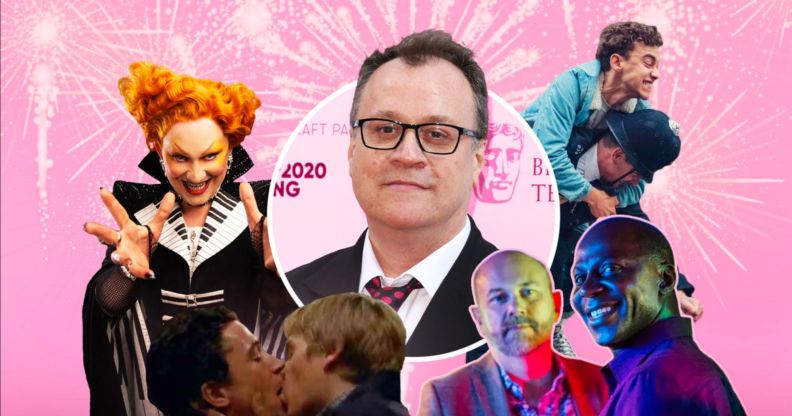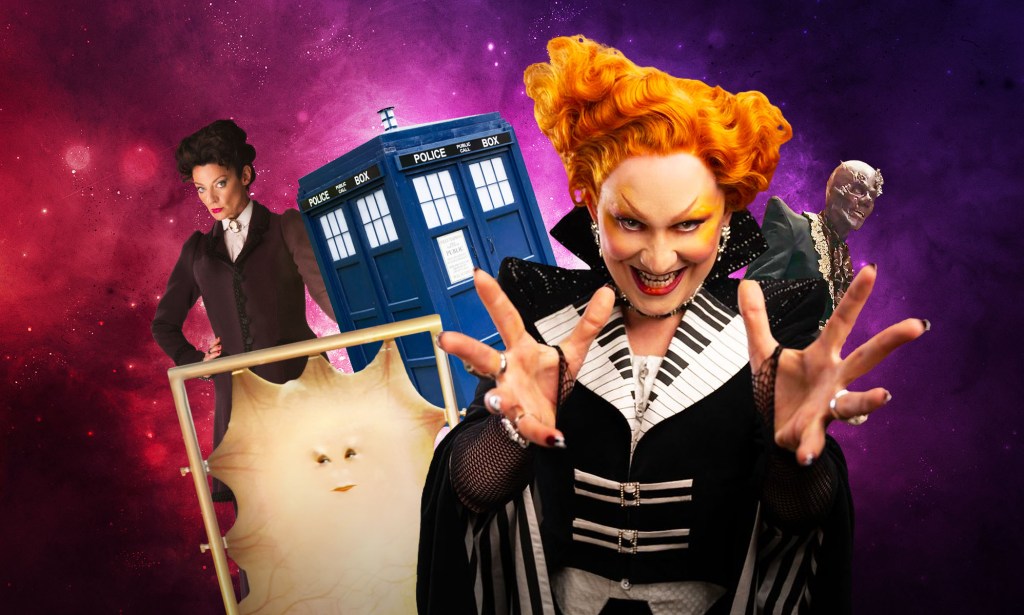Fans celebrate Russell T Davies’ 60th birthday sharing all the ways he changed TV for queer folk

Happy 60th birthday to the king of queer TV, Russell T Davies. (Getty / BBC / C4 / PinkNews)
Writer, producer and LGBTQ+ trailblazer Russell T Davies celebrated his 60th birthday on Thursday (27 April) and fans are reflecting on how he changed queer TV forever.
While Davies is probably best known for reviving the classic time-travelling BBC adventure series Doctor Who in 2005, much of his near 40-year career has been dedicated to beaming LGBTQ+ representation into our living rooms.
From 1999’s groundbreaking Queer as Folk, which put Manchester’s gay village under the spotlight in the best way possible, to 2021’s devastating AIDS drama It’s a Sin, queer people owe Davies a huge amount of gratitude for educating the masses on what it’s like to live as an LGBTQ+ person in Britain.
Yet, while bringing queer representation to network TV was a huge deal back in 1999, Davies managed to do so even earlier in his mammoth career.

Davies’ first attempt at putting LGBTQ+ people on our screens came in 1996, when his late night Granada TV soap opera Revelations featured a female vicar, Joan (Sue Holderness), coming out as a lesbian.
Then, in 1997, he brought us ITV’s hotel drama series The Grand, which featured an episode focusing largely on Clive, the hotel’s gay barman.
While neither show made the same waves as his later work, The Grand was in part the reason we ended up with some of his biggest, boldest and queerest TV to date.
While working on scripts behind the scenes at Granada TV, the story goes that Davies spent a lot of time working with the network’s former deputy head of drama, Catriona McKenzie. According to an interview with Davies in GQ, McKenzie had taken an interest in his writing, and when she moved over to Channel 4, he came with her.
Impressed by the gay episode he wrote in The Grand, McKenzie enabled him to begin work on what would become the UK’s seminal piece of queer television: Queer As Folk.
In the spirit of celebrating Russell T Davies, fans are thinking back to how to the series – which featured a young, gay Nathan (Charlie Hunnam) getting a rim-job in the very first episode – changed the game.
“In 1999 Queer as Folk was broadcast in the UK. It was the first time I had seen gay men whose lives were as joyful, sexy and chaotic as mine on screen,” shared Matthew Hodson, director of AIDS awareness charity NAM. “I was 31. Happy birthday to Russell T Davies – and thank you for consistently making TV queerer.”
“Watching Queer as Folk blew my mind and changed my life,” said another. “I had never seen gay people depicted in a positive light before.”
In 2005, Davies managed to take Doctor Who which, let’s be honest, has its fair share of innate camp and queerness anyway, and turn the dial up with the introduction of characters like Captain Jack Harkness – the Doctor’s first non-heterosexual companion.

Now, with the 14th season of Doctor Who on the horizon and Davies back where he belongs in the writers’ room, things are getting even queerer.
Taking up leading roles in the brand new cast are RuPaul’s Drag Race extraordinaire Jinkx Monsoon, trans Heartstopper breakout star Yasmin Finney, and the series’ first ever trans man, Pete MacHale.
Then, of course, there’s Channel 4’s equally heartwarming and heartbreaking It’s a Sin. Set in London during the height of the AIDS crisis in the 1980s, the show humanised the experiences of queer people in the UK during that time, arguably better than any show has done before.
It was a masterclass in mixing education with entertainment, and rightly sat atop the ‘best of’ TV lists of 2021.
Between these cornerstone pieces of LGBTQ+ TV excellence, though, Davies has always been working to further queer representation. Take Channel 4’s Banana, Cucumber and Tofu trilogy, which put a different facet of queer life explicitly under the microscope. The masses may have to strain to remember it, but the three series – Cucumber in particular – have had gays in a chokehold ever since.
At a time where LGBTQ+ lives are up for debate and derision, and so many are pushing back against the glorious, unapologetic representation we now see on our screens, we’re reminded of how much writers like Russell T Davies changed how LGBTQ+ are portrayed on screen – and how much they’re still needed.

